In this article:
Drinking water isn’t the only way to stay cool on hot days. Foods loaded with water and fiber help fill you up without the sluggish feeling you get after a large hot meal drenched in heavy oils or sauces.
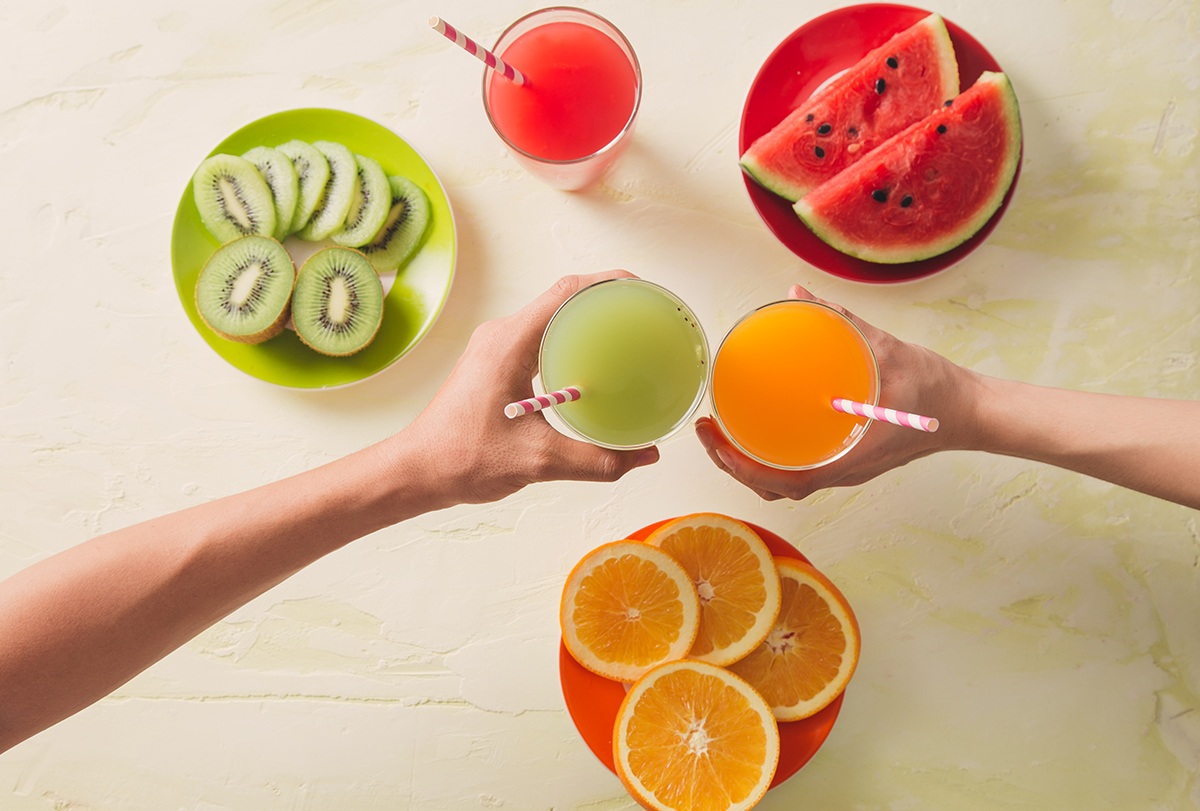
Hydration is one of the most important summer health tips. As the temperature rises, your body temperature cools off by perspiring, so you need a lot more water to replace all the fluid you lose in the summer heat.
In this article, learn summer health tips and the best summer foods to stay hydrated and prevent heat-related illnesses.
How Much Water Do You Need?
The body is made up of 50%–70% water. (1) The body loses fluids through its regular daily functions, so you need to keep replenishing with water.
Women need about 2.7 liters (11–12 cups) of water a day, (2) whereas men need about 3.7 liters (15–16 cups) of water a day. (2) With pregnancy, a high fever, diarrhea or vomiting, exercise, or hot weather, you’ll need even more water than these estimates.
Some Common Summer Illnesses
The body tries to cool down and maintain its temperature in the hot weather, although sometimes it can overheat. However, most heat-related illnesses are preventable.
Common summer illnesses caused by high temperatures and exposure to direct sunlight (3) include:
- Heat rash
- Sunburn
- Heat cramps
- Heat exhaustion
- Heatstroke
Foods That Help Beat the Heat
Food provides about 20% of the water you need and it’s another way to stay hydrated. (4) Fruits and vegetables contain high amounts of vitamins, minerals, and fibers, and they also contain 70%–99% of water. (4)
Incorporate these hydrating foods into your summer diet to get more than a cup of water from your meals.
1. Cucumbers
Cucumbers contain over 95% of water, making them among the best hydrating foods to eat during summer. Cucumbers make a great snack when dipped in hummus or sliced and eaten plain. Try a cucumber salad for an easy, no-cook side dish.
Add flavor to plain water with cucumber and orange slices. The refreshing flavor is thirst quenching.
2. Coconut water
Coconut water is the clear liquid from the inside of the coconut. It’s not water, so it has 43 calories in an 8-oz cup (226.8 g). It contains 94%–95% water. (5) Coconut water naturally contains potassium and sodium, making it a popular drink for rehydration after exercise.
3. Buttermilk
This drinkable curd contains 90% water. In India, buttermilk is a common drink to cool the body in the heat. In a study of the benefits of drinking buttermilk while working outside in the heat, buttermilk was found as hydrating as water. (6)
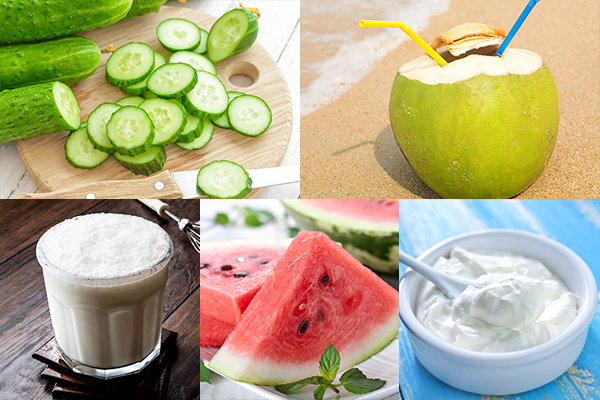
4. Watermelon
Water is in the name, so it’s no surprise that watermelon is 92% water. A slice of cold watermelon is as refreshing as a cold drink. Make homemade fruit bars by freezing blended watermelon. You can also freeze the puree in ice cube trays to drop into water for extra flavor.
5. Plain yogurt
Plain yogurt contains over 75% water. Most of the water is removed from Greek yogurt, making it thicker and higher in protein than plain yogurt. This cooling food is also high in calcium to protect you from bone loss. (7) Look for yogurt fortified with vitamin D.
For a quick breakfast, blend yogurt and frozen fruit together to make a cold smoothie with no added sugar.
6. Citrus fruits
Citrus fruits are refreshing summer fruits with a water content of 87%–88%. Lemons, orange, grapefruits, and limes have a cooling effect.
Citrus fruits are packed with vitamin C and phytonutrients that act as antioxidants. (8) A medium orange provides 116% of the daily recommended value of vitamin C.
Vitamin C helps lower inflammation in the body, keeps gums healthy, and aids in digestion by increasing iron absorption from food.
7. Kiwi
Kiwis contain 83% water. They have almost as much vitamin C as oranges. They’re high in vitamin K, vitamin E, and fiber, which aids in digestion.
One kiwi contains 11% of vitamin E, a fat-soluble antioxidant that protects the cells from free radical damage. (9)
8. Mangoes
Mangoes have a water content of 82%. This tropical fruit feels refreshing on a hot day. Enjoy this juicy fruit high in vitamins C, E, and A in a fruit salad, smoothie, or salsa.
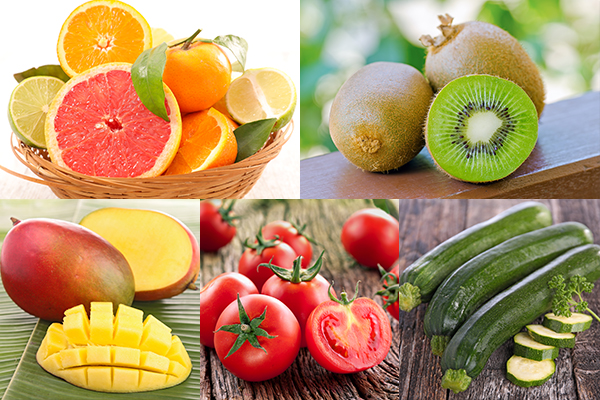
9. Tomatoes
Tomatoes have a water content of 95%. Add this rich source of the antioxidants lycopene, vitamin C, and vitamin A to salads for a cooling meal. Lycopene is a carotenoid, a pigment that gives tomatoes their rich color.
10. Zucchini
This mild-flavored cooling squash has a water content of 94%. Enjoy this versatile vegetable packed with vitamin C, B6, and potassium all year. For a cool summer meal, grill sliced zucchini or make spiralized zucchini “spaghetti.”
What Foods Should You Avoid?
Stick to water to quench your thirst. Some drinks cause you to lose fluids, increasing your risk of heat-related illnesses.
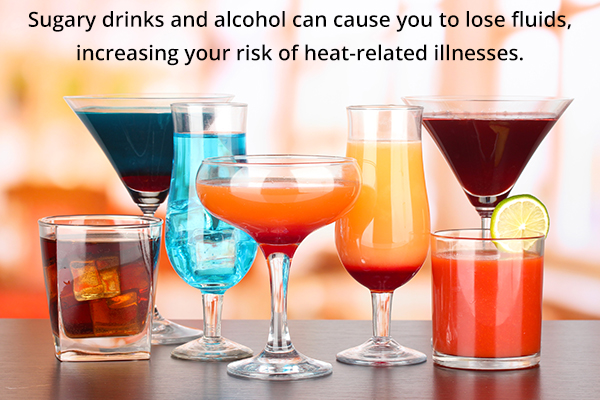
Sugary drinks
It’s tempting to reach for a cold soda on a hot summer day, but sugary drinks actually cause fluid loss.
The body tries to regulate the sugar in the body. When there’s too much sugar in the blood, your cells release water into the bloodstream to balance it out. This causes feelings of dehydration such as a dry mouth and thirst.
Alcohol
Waking up thirsty after drinking alcohol the night before is a common hangover symptom. Alcohol has a diuretic effect, causing fluid loss by increased urination. (10)
Alcohol also affects the body’s ability to regulate its temperature, so you’re more at risk of heatstroke and other heat-related illnesses.
Who Is at High Risk for Heat-Related Illnesses?
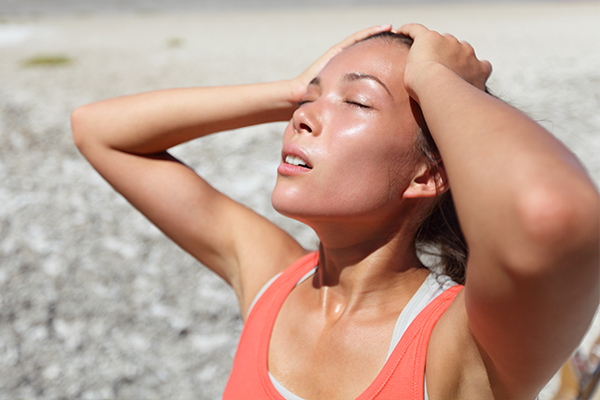
Anyone can suffer from a heat-related illness, although some people are at an even greater risk of getting ill in the hot weather. (11)
At-risk groups include:
- Infants and children – They overheat faster than adults.
- People older than 65 years old – Total body water decreases as age increases, so older people can dehydrate fast.
- People who are overweight
- People who overexert themselves with strenuous exercise or physical activity – They lose more fluids and electrolytes.
- People with illnesses such as heart disease, hypertension, diabetes, and Addison’s disease
- People who take certain medications including antihypertensives, hypolipidemics, hypoglycemics, and drugs for acid- or nervous-related disorders (12)
Early Signs of Dehydration
Dehydration symptoms range from mild to severe depending on how much fluid you lose. Early signs of dehydration that you should look out for include:
- Thirst
- Dry mouth
- Reduced urine
- Fatigue
- Weakness
- Physical discomfort
- Flushed skin
Symptoms of severe dehydration include:
- Headache
- Dizziness
- Impaired temperature regulation
- Exhaustion
When you have severe dehydration, you may need medical treatment to replenish fluids, especially if you’re vomiting. Severe dehydration that isn’t treated can be fatal.
Treating Mild Dehydration Symptoms
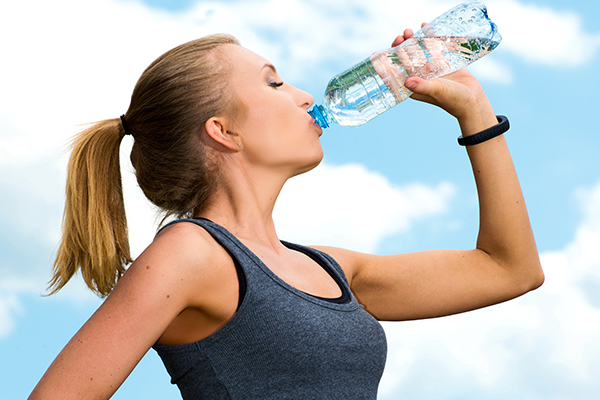
Mild dehydration can be treated at home by drinking enough water to replace the lost fluids. If you lose a large amount of fluid, an electrolyte drink with sodium and potassium might be necessary to restore balance. If you’re still outdoors in the heat, move to a cool place indoors.
Final Word
The summer heat can leave you feeling drained and sluggish. Boost your energy by eating smaller portions of lighter foods. Enjoy a variety of summer foods loaded with water, vitamins, and minerals to help keep the body comfortable and cool.
Summer is a time for long days at the beach or park, outdoor gatherings, and road trips. It feels good to be outside, especially after a long winter. So, it’s easy to lose track of time in the heat.
Dehydration is preventable. Stay hydrated and protect yourself from heat-related illnesses.
- Was this article helpful?
- YES, THANKS!NOT REALLY


